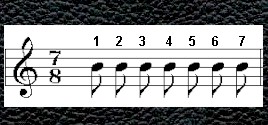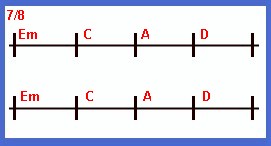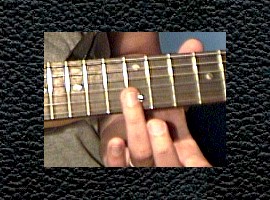Scroll through the lesson and click on notation/video/audio links to load the interactive players.
| Lyle Ronglien >> Rock Legends >> |
|
|
Please subscribe to get full access to all lessons for only $7.95/month PLUS 1 week free trial.

Riff Interactive lessons are
LESS expensive and
MORE interactive than alternatives!
More Info
|
|

ROCK LEGENDS II - ALEX LIFESON
Lesson Sample
Lyle: For over
30 years Alex Lifeson has been the guitarist for the progressive rock power trio
"Rush". Considered a "musician's musician", Alex
has always delivered a high level of musicality along with bassist Geddy Lee and
drummer Neil Peart as they collectively created highly complex musical passages
that are both popular to fans as well as musicians.
Lyle: Alex has used many different guitars,
amps and effects. To get his signature rock tone I suggest
using a guitar with a humbucker in the bridge position, add a little chorus
effect, then add a slight delay or reverb setting to get the big "concert"
sound. Suggested listening: Anything from
albums Permanent Waves and Moving Pictures and
2112.

Lyle: I enjoyed making this lesson topic for
several reasons. Alex's role as the guitar player in Rush
taught me how to fill up the sound of a rock trio by using big bar chords and a
slight effect on the guitar signal like chorus and delay. I also liked the way he had to play real
cool rhythms and riffs with the songs which were sometimes very hard to figure
out.
Lyle: Can anyone tell me what the time
signature is in the lesson sample? How many beats are there in a measure of
the sample?
nate: How can you tell?
Lyle: Try tapping your foot to the beat and
count.
MoeFugga:
4/4 ?
Lyle: Rush played many of their grooves in odd
time signatures, or something other than 4/4 time.
Rich: Is
that 5/4?
Lyle: The lesson sample is in 7/8
time.
Lyle: 7 - 8th
notes per measure!
7-8 time

nate: How can you hear just one
measure?
Lyle: Listen again to the lesson sample and
count to 7 for each 8th note beat. Hint - the chords change every
measure.
Lyle: You can listen to this little loop of 1
measure in 7/8 time:
7-8 time loop
Lyle: This is another reason why I like Rush
and Alex's guitar parts, they're not always "normal"! Can you feel and count the rhythm in 7/8
time when you listen to the lesson
sample?
nate: I can definitely tell it's not 4/4, straight
up and down stuff.
Lyle: Good. Now I'll show you the chords for
the first section of the sample.
Stratman: Is the sample in the key of
E?
Lyle: Yes, you are working in the key of E in
this lesson.
Lyle: These chords for rhythm riff 1 are very
typical of how Alex would address the issue of making a full sound using 5 and 6
string bar chords. Notice that they're not minor or major but sus chords
(suspended).
Sus2 chords are built from the 1 - 2 -
5
Sus4 are built from the 1 - 4 -
5
maj chords are built from the 1 - 3 - 5
minor chords are built from the 1 - b3 - 5
It's the 3 or b3 degree that makes a chord major or minor. Sus chords avoid
the 3rd.
Lyle: Remember, for all of the early
recordings, Rush didn't use keyboards to add to the sound. Alex was very into
creating the big sound on his guitar.
Lyle: Here's a jam track you can use for
rhythm riff 1:
jam
track - rhythm riff 1
Lyle: Here's what the chord progression looks
like "on paper":
rhythm riff 1 chord chart

Lyle: How is everyone doing with the 7/8 time
signature, are you able to change chords in the right
spot?
Stratman:
yes
jbmirrz:
yes
Lyle: Ok good. Let's move on to another part
of the lesson sample.
Lyle: This riff is another typical riff in
Alex's style. He likes to change from one sound to another within songs. Here
you'll change to a clean sound.
rhythm riff 2
Lyle: This
rhythm riff sounds so different than the first riff, but it's still the same
chords! In the same order
too! You're now playing all 4 chords within 1
measure.
Lyle: Learn the riff and repeat it over and
over.
Lyle: Try playing it along to this jam track.
Remember you're still in 7/8 time - 7 beats per measure!
jam track
- rhythm riff 2
Lyle: Another way you can play rhythm riff 2
is by strumming open chords along to the accent of the bass guitar like
this:
Lyle: This is a good riff to practice
of you have trouble with the arpeggiated version of rhythm riff 2.
Lyle: Here's a video clip of the chord
strum:
rhythm riff 2 strumming chords

Lyle: The tone of the guitar solo in the
lesson sample has lots of distortion to increase the sustain along with
delay/echo and chorus. You're basically in the key of Em so if
you wanted to improvise you could use the E minor pentatonic
scale.
Lyle:
I've split the solo into 2 parts since there's not many
notes. The first part starts off with harmonic
notes. Harmonic notes are generated by lightly
touching the string on top of the fret at a desired location, then
plucking.
12th fret
harmonic finger position

Lyle:
Play the audio from the tab file so you can hear what this solo riff sounds
like with the harmonic notes.
Lyle: Use the jam track for rhythm riff 1 to
practice the solo with. I'll be sending a complete jam track with both parts in
a minute.
Stratman: How do you get vibrato on the harmonic
notes?
Lyle: Now you have the first half of the solo,
here's the second half:
Lyle:
Stratman,
I'm using a whammy bar. Watch the video:
solo
Lyle: In it you'll see me hitting the harmonic
notes at the beginning of the solo as well as the use of the whammy bar for
vibrato.
Lyle: Here's a jam track with rhythm riffs 1
and 2:
jam track -
both rhythm riffs
Lyle: After you have learned to feel the
groove of this lesson in 7/8, you might get addicted to it.
Odd time signatures are so different than what most of us play in which is the
standard 4/4 time (4 beats to a
measure).
Lyle: Many of the songs Alex plays with Rush
use odd time as well as many other bands like Metallica, Soundgarden and other
progressive rock bands.
Lyle: If you would like to learn some of your
favorite Rush songs or riffs, I'd be glad to help. Email me at Lyle@theguitar.net and we'll discuss
setting you up for private lessons using Riff Interactive technology, just like
in this lesson! Thanks - Lyle

|
<< load notation from left
|
|
<< load audio from left
|
<< load audio from left
|